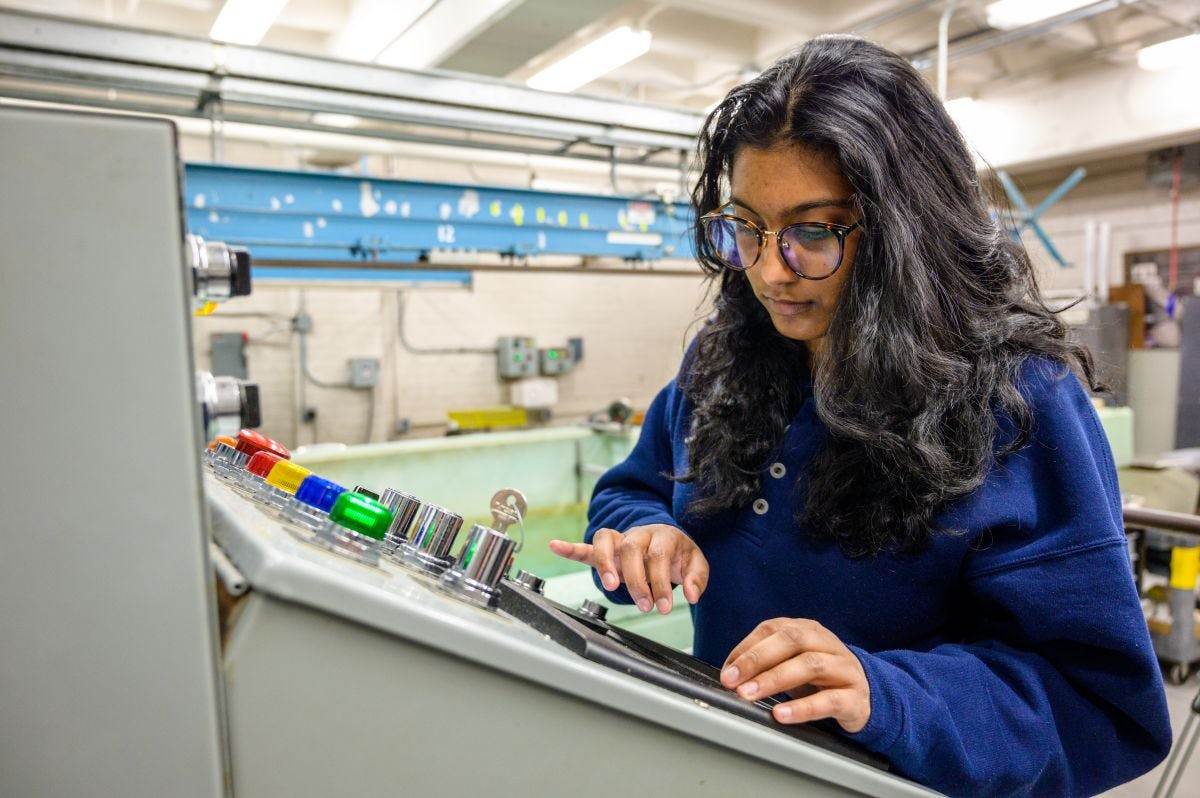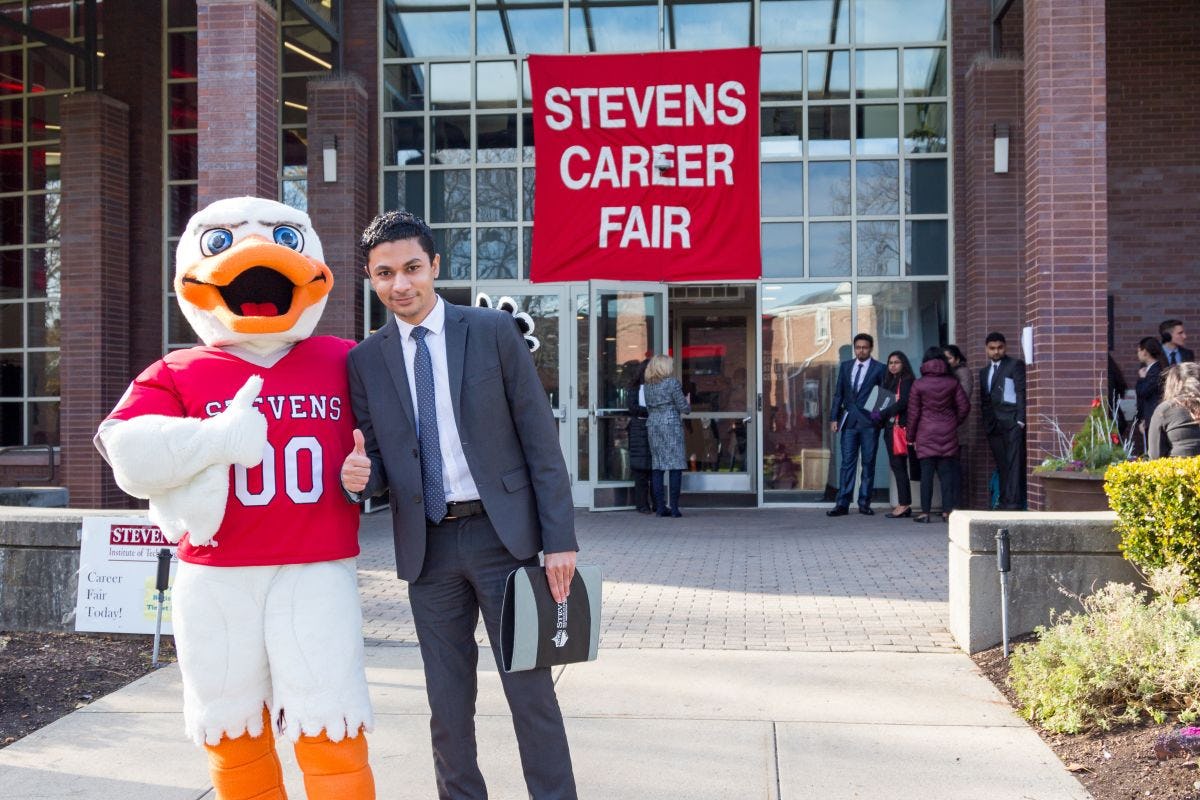Bachelor's Degree in Civil Engineering
Program Details
Degree
Bachelor of EngineeringAvailable
On campusLearn the versatile skill set needed to build a successful career in civil engineering.
Civil engineering is one of the most visible technical fields. It draws on aspects of physics, mathematics, project management, and many other areas. In addition to planning, designing and supervising the construction of public facilities — skyscrapers, roads, bridges, ports, irrigation systems and more — civil engineers are also involved in business, managing natural resources, addressing climate hazards, and modern societal challenges of all kinds.
In the civil engineering program at Stevens, you'll pursue a broad-based curriculum that provides a firm foundation in engineering, as well as substantial experience in the humanities and business engineering management. Within the sequence of civil engineering courses, you have the flexibility to focus in structural, geotechnical, water resources, environmental engineering, and construction management. You'll thoroughly explore mechanics, and develop a strong foundation in science, mathematics and computation. While earning your bachelor of civil engineering, you'll also receive hands-on, industry experience through senior design projects, co-ops, and study abroad programs.
Studying in the heart of the tri-state area, you'll be surrounded by modern marvels of civil engineering, as well as some of the top firms in the field. Partnerships with industrial firms, engineering consulting firms and construction contractors in the public and private sector, as well as various government agencies, offer an array of opportunities to connect with the real-world of civil engineering.
The Stevens Advantage: Hands-On Learning, Real World Experience
At Stevens, you’ll learn to think like an engineer. Our design-focused curriculum features a hands-on course every semester that will instill you with broad, foundational knowledge, the complete fundamentals of engineering, and entrepreneurial thinking. Learn more about what makes an engineering education from Stevens a unique experience:
The Design Spine: a unique, design-focused, hands-on course every semester that incorporates entrepreneurial thinking and experiential learning, culminating with Senior Design, a team capstone project working on prototypes for real business problems, potentially in collaboration with a real company
Innovation Expo: an exciting design and entrepreneurship competition where students showcase their senior design prototypes and pitch business ideas
Engineering Cooperative Education Program: nearly 30% of all engineering students participate in Stevens’ Cooperative Education Program where you get on-the-job experience working for real companies
State-of-the-Art Research Labs and Facilities: build, tinker and test your designs in Stevens' MakerCenter, Prototype and Object Fabrication Lab, or numerous other research facilities
Undergraduate Research Opportunities: our research-oriented curriculum gives you in-the-lab experience while you're still an undergraduate student
More opportunities for Stevens undergraduate students include:
Double count undergraduate course credits toward a graduate degree and earn your master's faster – in just five years through Stevens' Accelerated Master's Program >
See what it's like to be a civil, environmental, or naval engineer at Stevens by visiting the links below.
An ABET Accredited Program
The Bachelor of Engineering in Civil Engineering program is accredited by the Engineering Accreditation Commission of ABET, https://www.abet.org, under the commission’s General Criteria and the Program Criteria for Civil and Similarly Named Engineering Programs.
Mission
The civil engineering program produces graduates who possess a broad foundation in engineering and liberal arts, combined with a depth of disciplinary knowledge. This knowledge is mandatory for success in a civil engineering career. Civil engineering is a wide field, and this program educates a new generation of civil engineers to be leaders in the profession, emphasizing technical competence, professional practice, civic contribution, and entrepreneurship.
Program Educational Objectives
The objectives of the civil engineering program are provided in terms of our expectations for our graduates. Within several years of graduation:
Our graduates will be known for tackling challenging civil engineering problems through visionary planning and innovative, resilient, equitable, and sustainable designs.
Our graduates will be recognized for upholding the highest ethical principles in addressing complex professional and social problems that will face future civil engineers.
Our graduates will practice teamwork and attain leadership positions and will broadly benefit society while advancing the civil engineering profession, its domain, and its impact.
Many of our graduates pursue advanced study in civil engineering, mechanical engineering, systems engineering, consulting, business, law, and many other fields.
Student Outcomes
By the time of graduation, students majoring in civil engineering will have the ability to:
Identify, formulate, and solve complex engineering problems by applying principles of engineering, science, and mathematics
Apply engineering design to produce solutions that meet specified needs with consideration of public health, safety, and welfare, as well as global, cultural, social and environmental, and economic factors
Communicate effectively with a rage of audiences, writing and presenting technical content
Recognize ethical and professional responsibilities in engineering situations and make informed judgements, which must consider the impact of engineering solutions in global, economic, environmental, and societal contexts
Function effectively on a team whose members together provide leadership, create a collaborative and inclusive environment, establish goals, plan tasks, and meet objectives
Develop and conduct appropriate experimentation, analyze and interpret data, and use engineering judgement to draw conclusions
Acquire and apply new knowledge as needed, using appropriate learning strategies
Understand the steps involved in taking a technology from conception to market, and can demonstrate these steps by an actual or hypothetical example
Putting You on Track for Professional Success
Engineering Careers
The civil engineering bachelor’s program develops in-demand knowledge and skills to put you on track for career success. Career opportunities include:
Civil Project Engineer
Site Engineer
Structural/Bridge Engineer
Construction Engineer
Water Resources Engineer
Civil Infrastructure Engineer
Geotechnical Engineer
Project Manager
Companies Hiring Civil Engineers:
Tishman Construction, Thornton-Tomasetti Engineering, Port Authority of New York and New Jersey, Stantec Construction, Turner Construction, New Jersey Department of Transportation (NJDOT)
A Tech Forward Education
Undergraduate Programs Facts & Statistics
Related Programs
Bachelor's Degree in Environmental Engineering
Hone the skills and knowledge necessary to find solutions to today’s most pressing environmental issues.
Bachelor's Degree in Engineering - Naval Engineering Concentration
At Stevens, you’ll develop the foundational skills today’s naval engineers need in one of the nation’s highly regarded engineering programs.






